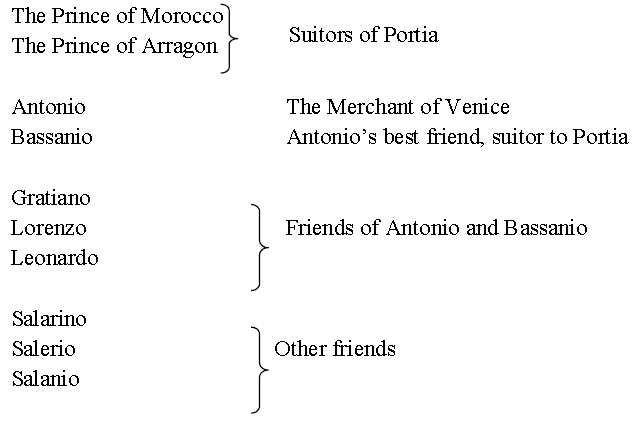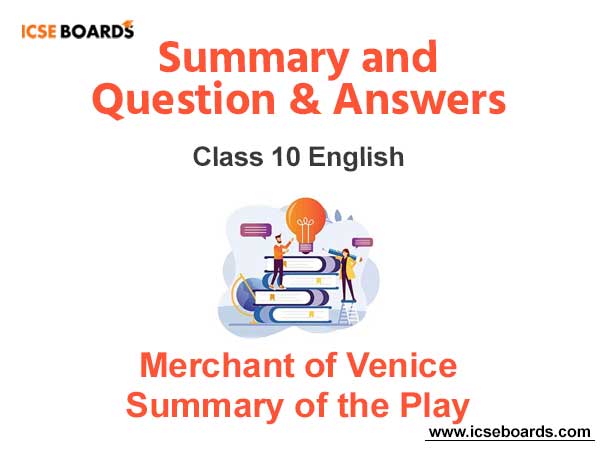Students should read the Merchant of Venice Summary of the Play ICSE Class 10 notes provided below designed as per the Merchant of Venice book used in ICSE Class 10 English Books. You should refer to all notes provided here for Merchant of Venice Workbook which are really important and can help you to get better marks in ICSE Exams
Summary of the Play Merchant of Venice William Shakespeare
Students in ICSE Class 10 English should read about Summary of the Play of Merchant of Venice written by William Shakespeare. Many questions can be asked in the exams about his novels and his life and work. We have provided below a Summary of the Play Merchant of Venice which will be useful for students. This will help to get more marks in English exams in Class 10th English.
William Shakespeare Summary of the Play Merchant of Venice ICSE Class 10
Merchant of Venice Summary of the Play
In ancient days, the city of Venice in Italy was one of the richest in the world, and its people lived in great
style. Among the wealthiest of its merchants was Antonio, whose fleet of ships carried its merchandise over the
whole of Europe.
Antonio was a kind and generous person and a real friend. Closest to him was Bassanio who was a handsome noble young man and spent more than his means allowed. He knew that his friend Antonio would always help him. Antonio was loved by all but one. Shylock the Jew hated him because Antonio helped people and lent money without interest while Shylock lent his money at very high rates of interest and was cunning, merciless and greedy.
One day Bassanio came to Antonio and told him about Portia who was an heiress and whom he loved and wished to marry, but he needed money to go to Belmont and compete against the rich and powerful princes and noble men who were coming from all over the world to woo Portia. Antonio said, whatever he had, belonged to his friend but unfortunately all his money was bound in his ships, still he would try to get money.
Failing everywhere they go to Shylock, Antonio’s enemy. As soon as Shylock knew the reason of their arrival,
he said, “money-does a cur has money?” Antonio also because of Shylock’s greed and cruelty had abused him
openly in the past. He told Shylock that he had not come to him as a friend. He should give him money considering him his enemy.
Shylock’s crafty mind hatched a plan to take revenge from Antonio and he told them that he could give the money if Antonio was ready to sign a bond. The condition of the bond was if Antonio was not able to pay the three thousand ducats back within the given time, he would forfeit a pound of his flesh. Bassanio asked Antonio not to sign such a dangerous bond but Antonio, being confident of his ships’ return in time, signed the bond. Bond story is one
of the main plots of the play. Bassanio went to Belmont to woo Portia. Her father had made a special provision regarding her marriage. There were three caskets, gold, silver and lead. In one of them, there was Portia’s picture. Every suitor had to choose and open a casket. Whoever opened the right casket with Portia’s picture could marry her whether she liked the person or not. This lottery of caskets forms another main plot. Bassanio succeeded in choosing the right casket. His friend Gratiano fell in love with Nerissa, Portia’s lady in waiting and wanted to marry her. In the middle of these joyful festivities came the appalling news from Venice that Antonio’s bond was forfeited, his ships had not returned and Shylock was ready to get his pound of flesh, that is, his revenge.
In the meantime, Shylock’s daughter married Antonio’s friend and companion Lorenzo. As Shylock hated Christians and especially Antonio, he was enraged and shocked. Now his desire to take revenge was at its peak. He believed it to be a conspiracy of Christians against Jews.
In Belmont, Portia told Bassanio that he should immediately reach Venice and try to help his friend. because
now Bassanio had told her that he was able to come to Belmont and woo her only with his friend Antonio’s help.
Portia was both clever and practical. She,
listening to this asked Bassanio to marry her immediately, so that what belonged to her would become his also and
he would be able to help his friend. They were married. Gratiano followed the suit and married Nerissa. Now Bassanio was no longer a poor man and he could go immediately to Venice to see how he could help his friend with the large amount of money that Portia had placed at his disposal.
When Bassanio reached Venice, the trial had already begun. Shylock showed no mercy even though the Duke asked him to have pity and forego the forfeiture but Shylock said “I want justice …. If you deny, fie upon your law…. I stand for judgment…..”
Bassanio tried to plead with Shylock and said, “For your three thousand ducats I offer six thousand.” Shylock replied, “If every ducat of your six thousand were another six, I would still not accept. I want my bond honored.”
At this point. a young clerk entered the court and presented a letter from Bellario the learned lawyer, who, it was hoped, would agree to plead Antonio’s case. In this letter Bellario had said that he was ill, so he was sending a young but very competent lawyer who knew the case and he had discussed it with him. In Bellario’s opinion. this young
lawyer was very able and wise, abler and wiser than anyone he had met. In fact, this was Portia disguised as a lawyer and the clerk was Nerissa. Equipped with intelligence, wit, the will to save a noble man from certain death and robes normally worn by a counselor in court, Portia or Dr. Balthazar entered the court.
She already knew the extent of the brief and in the beginning, she asked Shylock to show mercy. It is the finest speech on mercy in the world of literature. She said, “It (mercy) drops from heaven like gentle rain. It is twice blessed because it blesses him who is merciful as well as the person who receives it.”
But Shylock said, “Let him forfeit the bond.” She also asked Shylock to take three times the sum owed to him. Again, Shylock refused saying, “I want my bond honored.”
She then said that according to law, the Jew could claim the pound of flesh. She asked the Jew to prepare his knife. Shylock was overjoyed. “O noble judge, he cried, ‘A Daniel come to judgment.” Once again she asked Shylock to be merciful and once again he refused. She asked if he had scales ready. He replied, “yes.” She said to Antonio that he must prepare his bosom for the knife. With great dignity Antonio began to say goodbye to his friend Bassanio. In fact, Antonio was resigned to his fate and weary of his life. Now there was no hope for him and there was the atmosphere of gloom all over the court because Antonio was loved and respected by all. With great joy and excitement, Shylock was ready to cut Antonio’s flesh. As he raised his knife Portia said, “Tarry Jew!” and dropped her bombshell. She told him that according to the bond, he could take a pound of flesh from Antonio’s body,
but in cutting it, if he shed a single drop of christen blood, his lands and goods would be confiscated.
Gratiano cried in joy repeating the few words, “O upright judge! Mark, Jew. O learned judge.” Shylock was dumbstruck. Then he said, “I take this offer then pay the bond thrice and let the Christian go.” Bassanio was ready with the money and Portia exclaimed that the Jew shall have all the justice. However, she told everyone that according to the laws of Venice, if anyone who was not the citizen of Venice tried to take the life of a citizen, half his property
would go to the person, against whom he had conspired and the other half to the state of Venice and his life would be in the Duke’s hands. He should better beg mercy of the Duke.
That was the irony of fate. The man who rejected mercy was forced to beg for it. But both the Duke and
Antonio showed mercy. The Duke pardoned his life and Antonio said he did not want Shylock’s wealth. If he
agreed to leave his state at his death to his daughter, Jessica, who had married Lorenzo a Christian, he (Antonio) was not interested in his wealth.
Shylock agreed to this. A deed was drawn up and he signed it and turned away leaving the court.
The trial was a triumph for Dr. Balthazar (Portia). The Duke praised him and Bassanio invited him to dine with him but Portia refused because she wanted to reach Belmont before Antonio and Bassanio. Bassanio wanted to pay her money which she refused. Then after more insistence from Bassanio, she took the ring, which was given to him by her, Nerissa also took Gratiano’s ring.
Thus, she reached Belmont before Bassanio, Antonio and their friends. In due course, she discovered that Bassanio’s ring was missing from his finger. She pretended to be angry. She said that he had given it to another woman. It seemed the quarrel would be serious, but Antonio intervened to tell Portia what had really happened.
Portia loved drama and cries. Now she gave him his ring back and told them that she was Dr. Balthazar and Nerissa told Gratiano that she was the clerk. Bassanio was surprised and awestruck. Ring episode is the sub-plot of the play. Once again all was well. Jessica and Lorenzo had arranged the wedding feast for Portia and Bassanio. In the midst of feast, the good news came that Antonio’s ships had come home safely. And the Merchant of Venice was again wealthy happy and generous. But none of them, not even Jessica had a thought for the lonely Jew (Shylock) who had been deprived of his pound of flesh, his revenge and his wealth. He lived alone in misery.
To create fun and comic relief, the character of Launcelot Gobbo is created. He acts as a jester and also a go between Lorenzo and Jessica, whose father he served and later went to serve for Bassanio.
The themes in the play are of love, friendship and loyalty.
Characters In The Play
The Duke of Venice

Shylock A Jew and wealthy money lender
Jessica Shylock’s daughter
Tubal Another Jew
Launcelot Gobbo A comical clownish character. Shylock’s servant
Old Gobbo Launcelot’s father
Portia The rich heiress of Belmont
Nerissa Portia’s lady in-waiting
Dr. Balthazar Lawyer (Portia in disguise)
Stephano Servant of Portia
Merchants, officers of the Court of Justice, Musicians, servants of Portia and other attendants.



